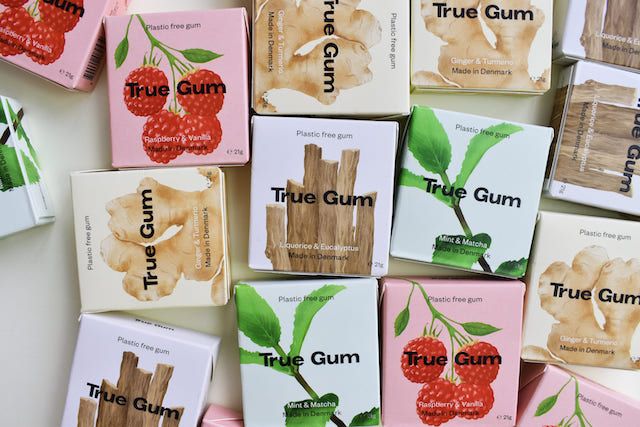Here’s a fact to chew over: spit out a stick of conventional chewing gum, and it will decompose – in roughly 1,600 years. That’s a lot of sticking around for just a few minutes of minty freshness.
Granted, this slow rate of decay may have an upside for some – including archaeologists, like those in Denmark examining ancient birch tar chewing gum to trace Neolithic human DNA.
Nonetheless, modern gum’s glacially slow biodegradability is generally seen as troubling for the environment. That was the view of four entrepreneurs — also in Denmark — who’d just watched The Dark Side of the Chew, a muck-raking documentary exposing the murky practices of the global chewing gum industry.
The world’s smallest chewing gum factory
They learnt that gum is made with a synthetic, petroleum-derived rubber base, which contains several of the same materials found in plastic bottles, glue, and car tires.
But they still wanted to chew gum. So in 2017 they founded True Gum, a startup developing plastic-free and plant-based chewing gums with novel flavor varieties like ginger, turmeric, vanilla, and matcha.
Now running what it describes as the “smallest chewing gum factory in the world” in Copenhagen, it’s capable of producing 350 kilograms a day.
The team has just raised €1 million ($1.2 million) from German VC Oyster Bay — run by veteran food and beverage consumer goods entrepreneur Christoph Miller — to further expand the business and enter new markets. Since April 2018, the startup has successfully positioned its sustainable alternative across more than 10,000 retail outlets spanning 14 European countries.
Speaking to AFN, Miller said he had enjoyed the taste of True Gum and loved the concept, hailing it as “sustainable to the core” and predicting that it’ll be “popular with modern consumers.”
It’s off to gum we go!
Swapping out the synthetic bits of conventional gum initially proved tricky for the team. They carried out countless home experiments with an array of natural ingredients before alighting on chicle – a product made from the sap of Central American Manilkara trees that the Aztecs and Mayans historically used as a chewing gum.
Co-founder Peter Juul Regnersgaard sees the use of the ingredient as a chance to “work with local cooperatives in a way that discourages deforestation of rainforests.”
He said True Gum marks an overdue return to the use of tree resin, which had been largely swapped out for petroleum products by manufacturers in the 20th century in a rush to meet mass demand.
“No trees are ever cut down,” he said, suggesting that heightened demand for chicle could help to reduce the clearance of rainforest for soy, sugar, coffee, and palm oil cultivation. “The extraction of resin is a natural method. Then they leave the trees alone. This creates a source of income for locals.”





